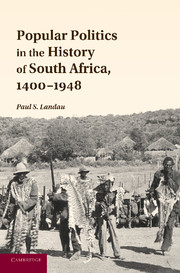Book contents
- Frontmatter
- Contents
- List of Figures
- Preface: The Birth of the Political
- Acknowledgments
- 1 Eyewitness Engagements (Highveld political discourse at the start of the 1800s)
- 2 History before Tribes (Partnership, alliance, and power)
- 3 Translations (Missionaries and the invention of Christianity)
- 4 The Incipient Order (Moroka's reign, 1828–1880)
- 5 Mixed People (The Samuelites, the Griqua, and other subjectivities, 1880–1928)
- 6 Twentieth-Century Tribes
- Primary and Archival Sources
- Bibliography
- Index
- References
3 - Translations (Missionaries and the invention of Christianity)
Published online by Cambridge University Press: 04 August 2010
- Frontmatter
- Contents
- List of Figures
- Preface: The Birth of the Political
- Acknowledgments
- 1 Eyewitness Engagements (Highveld political discourse at the start of the 1800s)
- 2 History before Tribes (Partnership, alliance, and power)
- 3 Translations (Missionaries and the invention of Christianity)
- 4 The Incipient Order (Moroka's reign, 1828–1880)
- 5 Mixed People (The Samuelites, the Griqua, and other subjectivities, 1880–1928)
- 6 Twentieth-Century Tribes
- Primary and Archival Sources
- Bibliography
- Index
- References
Summary
Christianity commenced in South Africa's heartlands in the second decade of the nineteenth century. From the perspective of highveld people, the faith began as a novel way of using the language of mobilization, brotherhood, and settlement. In the midst of the violent displacements of the 1820s – the Difaqane – small numbers began to rework their basic political vocabulary in its remit. Among the pioneers were métis men from the Cape and the borderlands. Establishment missions insisted on the apolitical nature of métis and African mobilizations, argued with them, and translated and retranslated them. In this back-and-forth process, Christianity came to be.
This chapter is about the early translations that midwived Christianity out of highveld speech and highveld ideas. It is not claimed that such is all that Christianity was, nor all it became, but it was at least this. In particular the chapter is concerned with Robert Moffat, the pioneering missionary and translator. In contact with Christian converts, patriarchs, and other evangelists, Moffat contributed more than anyone else to Christianity's written canon. Only by understanding his interactions with junior chiefs and lords, in the crises marking the 1820s, can we grasp how Africans, métis, and Europeans together made Christianity in South Africa.
Scholars have produced a large and impressive historical literature about missionaries and imperialism in the colonial and postcolonial world. For southern Africa, there have been several veins of interpretation, but in recent decades Jean Comaroff and John L. Comaroff have created an especially enduring and influential model.
- Type
- Chapter
- Information
- Popular Politics in the History of South Africa, 1400–1948 , pp. 74 - 107Publisher: Cambridge University PressPrint publication year: 2010



